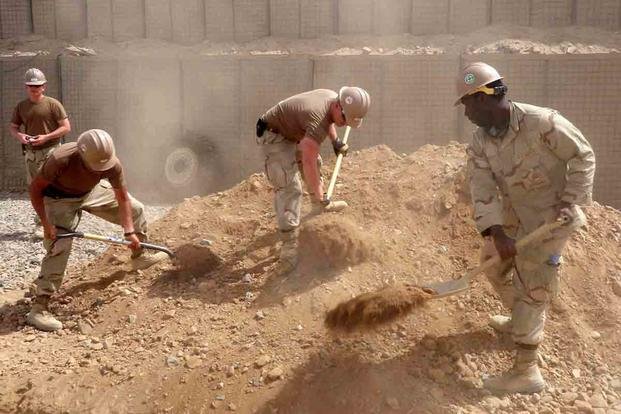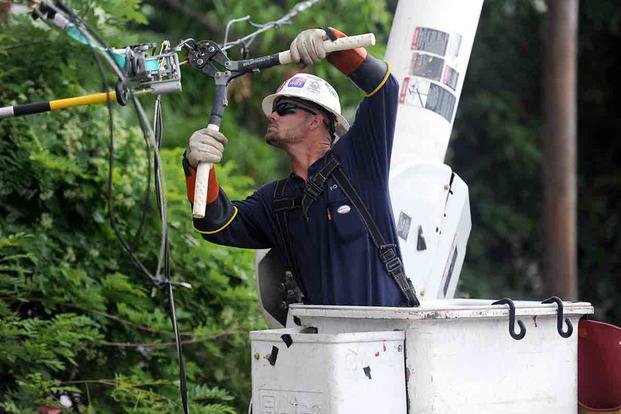Veterans hear it all the time: Employers want to hire America's heroes! Since 2012, the effort to hire veterans has ramped up exponentially. There really are hiring fairs, expert headhunters and entire human resources departments devoted to recruiting veterans for civilian companies -- and it's not because we're all heroes.
The reason the number of veteran hiring programs skyrocketed beginning in 2012 is because Syracuse University's Institute for Veterans and Military Families (IVMF) published a real business case for hiring veterans, written by a Ph.D. and based on 10 research-informed propositions on the value of veterans in a competitive business environment.
In 2016, that same report was later backed up by a 24-page report from the IVMF on how to develop the return on investment from vet hiring programs. So while you may or may not consider yourself America's hero, there's an employer out there who thinks you're at least a hot commodity. Here's why.
1. Veterans Are Entrepreneurial.
"Entrepreneurial" doesn't mean veterans necessarily want to run off and start their own businesses. It means vets tend to have the same attributes that successful business owners have: self-efficacy, need for achievement, they don't need to be managed, are comfortable with uncertainty and make good decisions under pressure.
No one runs a business like the owner, because they have the most skin in the game. When veterans are hired as employees, they show the same qualities in their work as the owner would. They're self-sufficient, trustworthy and work toward the good of the business. These same qualities are the reason veterans are twice as likely to start businesses than non-veterans.
2. Veterans Assume High Levels of Trust.
Research shows trust is a significant predictor of high-performing teams, both in and out of the military. Integrity is a value instilled in service members from the start. Almost every branch of the military mentions integrity in their creed, core values or elsewhere, so it's no wonder that IVMF research shows military service engendered trust.
Veterans are not only trustworthy to co-workers and managers; the trust they build between themselves, co-workers and managers also spreads between teams and into the whole organization. The result is a high-performance culture.
3. Veterans Are Adept at Transferring Skills Across Contexts and Tasks.
The first casualty of war is the plan. In the military, troops learn to make do with what they have, wherever they are. Military members are trained to deal with situations when the plan goes awry. In response, military personnel will reorient their skills to deal with the evolving situation.
Military planners might call it "contingency operations," but for the individual, the ability to recognize and transfer skills to a different context or an evolving situation is a valuable skill. Employers want people with the ability to use training in an unfamiliar environment or task with little or no oversight, and chances are good veterans have been doing this for their entire careers.
4. Veterans Acquire and Leverage Advanced Technical Training.
Every Marine may be a rifleman, but they also have some kind of advanced technical training. Though the rest of the branches don't have the same rifleman ethos, every service member who joins the military is either trained in a technological career field or is exposed to advanced technology at some point in their career.
This means veterans are adept at working with new and emerging technologies, learning to use them proficiently and can transfer the skills they acquire to new areas of expertise, even if those areas are disparate from their original training. The wide experience gained in using tech in the military puts vets ahead of non-veterans in their age groups.
5. Veterans Are Comfortable and Adept in Discontinuous Environments.
Many veterans employees pride themselves on their ability to thrive in chaos, and the research backs that up. Military experience positively correlates to the cognitive ability to evaluate an evolving situation or environment and act effectively in the face of uncertainty.
Businesses, especially those in information and technology sectors, are constantly changing and evolving, and they're looking for future employees who can work efficiently and effectively in these kinds of environments.

6. Veterans Exhibit High Levels of Resiliency.
Resiliency is successful adaptation, even in the face of adversity, hardship and trauma, to new and changing situations. It is also developing competencies in those situations that allow an individual to excel. It means bouncing back from failures, either personal or professional, and veterans overwhelmingly exhibit resiliency in their everyday lives.
Studies have shown veteran resiliency is the result of their military experience, enhancing their abilities to adapt and grow from failures more quickly and completely than those who did not serve in the military.
7. Veterans Exhibit Advanced Team-Building Skills.
The military is a team, composed of smaller teams, all working together toward goals that make up the military's missions. Being in the military not only makes its members believe they can serve effectively as a team member, it enables high performance as part of that team. Military service specifically enhances individuals in three key ways:
• Organizing and defining team goals and missions
• Defining team member roles and responsibilities
• Developing a team's plan for action
8. Veterans Show Strong Organizational Commitment.
A surprising feature of any strong social group is that the identity of its key members becomes intertwined with the identity of the organization. Military branches are particularly adept at this kind of institutional socialization, and as a result, veterans can bring this strong organizational commitment and loyalty to a civilian workplace.
A business with a lot of veterans will experience lower turnover and attrition rates and produce higher quality work, because the organization's customs and standards are more easily adopted throughout the business.
9. Veterans Have and Leverage Cross-Cultural Experiences.
Increased globalization in world economies means that individual employees in world-class businesses and corporations need to accept and operate in multicultural areas and transcend international boundaries. Studies show military members and veterans have had experience in three important multicultural areas, compared to non-veterans in their peer groups:
• Veterans have more international experience.
• Vets speak more languages, more fluently.
• Veterans have a higher understanding of cultural sensitivity.

10. Veterans Have Experience and Skill in Diverse Work Settings.
The military may be criticized for a lack of diversity at times, but the research shows that America's all-volunteer military is actually a diverse workforce across a number of important demographics, which include education, ethnicity, culture, values and individual goals and aspirations.
This experience means veterans entering the civilian workforce are more accepting of co-workers' differences in the workplace, especially in interpersonal relationships. Veterans also exhibit a high degree of cultural sensitivity.
-- Blake Stilwell can be reached at blake.stilwell@military.com. He can also be found on Twitter @blakestilwell or on Facebook.
Want to Know More About Veteran Jobs?
Be sure to get the latest news about post-military careers as well as critical info about veteran jobs and all the benefits of service. Subscribe to Military.com and receive customized updates delivered straight to your inbox.











